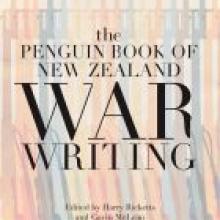
The editors, Harry Ricketts, a professor in the English programme at Victoria University of Wellington, and Gavin McLean, a senior historian at the Ministry for Culture and Heritage (and Otago Daily Times book reviewer), have cast their nets widely indeed.
They have produced a volume that no-one with an interest in wars in which this country has become ensnared should miss reading.
The book is a vast treasure trove of material that will surely encourage many readers - after dipping into more than 500 pages of writing devoted to New Zealanders' wars - to go further afield for information at its source.
New Zealand War Writing is packed with short stories, poems, extracts from novels, plays and historical accounts.
The book is divided into various sections: 1. Domestic Wars: pre-colonial conflict to the New Zealand Wars; 2. The Wars of Empire: from South Africa to the Western Front; 3. The Second World War; 4.
The Cold War and after - from Korea to Afghanistan; 5. Reflections.
In ''Domestic Wars'', by Anne Salmond, Abel Tasman meets up with Maori in 1642. Three sailors are killed by Maori clubs and paddles. One sailor is mortally wounded.
Wiremu Tamihana Tarapipi te Waharoa wrote Letter to His Excellency the Governor from the Runanga assembled at Ngaruawahia (1861).
''Let our warfare be that of the lips alone,'' he wrote.
''If such be the course pursued by us it will be a long path, our days will be many while engaged in fighting the battle.''
Anon is quoted in ''The Home Front'' on the First World War:
''I'd love to live in Trentham
For a week or two,
To work all day for fun and pay
And live on army stew.
The potatoes they are rotten
And the meat will walk to you,
I'd like to live in Trentham
For a week or two!''
Maurice Gee's novel, The Fire-Raiser (1986), is set in a New Zealand town in 1915, when a patriotic pageant gets out of hand, and a pyromaniac sets his sights on the piano of Frau Stauffel, a German music teacher.
Of Anzac: A Retrospect (1965), by Cecil Malthus, historian Christopher Pugsley wrote: ''Malthus's trench-eye view became my doorway into our understanding of what happened.''
He called it one of the two classic memoirs of the New Zealand experience in World War 1.
Of particular interest to Otago readers is an extract from Gallipoli to the Somme: Recollections of a New Zealand Infantryman (1963), by Alexander Aitken.
Known as ''Swotty'' at Otago Boys' High School (where he briefly taught after the war), Aitken wrote that he never saw Field-Marshal Sir Douglas Haig or General Sir Henry Rawlinson.
''As for their work, it was sometimes, as will be seen on 25th September, surprisingly good; equally sometimes, as on the 27th, slipshod.''
In the North Africa section, there is room for Anon and an extract from his song, One Night as I Strolled Down the Berkha:
''One night as I strolled down the Berkha,
That horrible street of ill fame,
Got to know all the dirty old harlots,
Got to know them all by their names.''
In the section on Italy, John Male is quoted from Not All of Us (1944):
''Who wants to be articulate
These
are years we have lost; love a memory;
excuse us if we are silent
as the dead are.''
The editors observe that the account of life in the fox-holes by Major I.
G. O'Neill ''shows that warfare in the tropical Pacific was as much a battle with Nature as with the Japanese''.
Major O'Neill in The 36th Battalion (1948) noted: ''We were only apprentices in the school of the fox-holes, but we will assuredly master them and the night. For the struggle against Fascism is the struggle against the night; it is fitting that we should start here - in the fox-holes.''
Otago Medical School Maori health scientist John Broughton, writes in his play on Vietnam, Michael James Manaia (1994):
''So our job, aye,
was to ferret out
any dinks, chinks, coons,
the little slit-eyed bastards,
in that particular area.''
In the section on Reflections, Jim Henderson, in Protected by the Waters of the Nile (2000), writes about an artilleryman wounded in the desert, who recalls:
''And this second German spoke in perfect English too and he said, 'No, no, you've got it all wrong. For you, my friend, the war is over. We're friends now, we're friends.' . . .
''He reached over and held me by the wrist and stroked my forehead with his other hand . . . I thought the Germans were some sort of hairy, merciless ape, but now I realised that they were human beings.''
Poet James K. Baxter in Returned Soldier (1946) observes:
''The boy who volunteered at seventeen
At twenty-three is heavy on the booze
Strafed in the desert and bombed out in Crete -
With sore dark eyes and hardened by the heat
Entitled now to call himself a man
And in the doll's house walk with death at ease:
The Cairo women, cobbers under sand
A death too great for dolls to understand.''
• Clarke Isaacs is a former ODT chief of staff.











